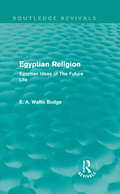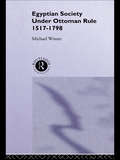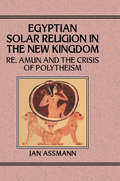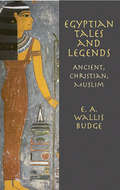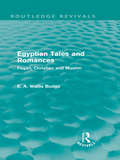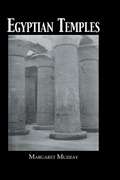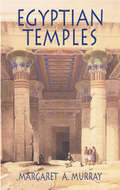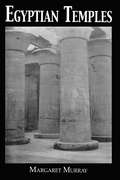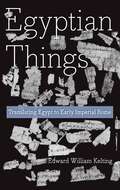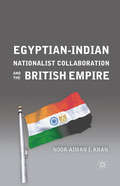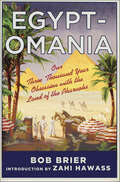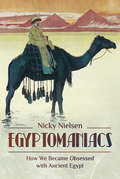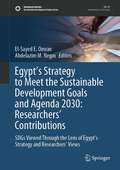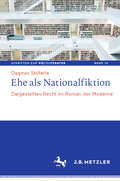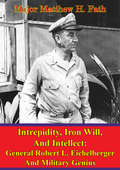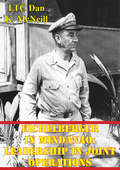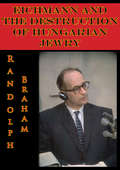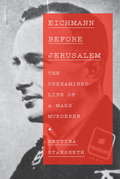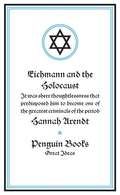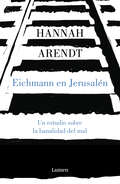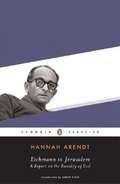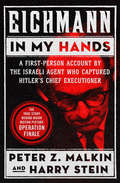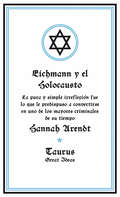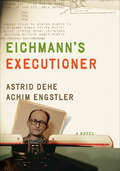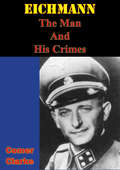- Table View
- List View
Egyptian Religion: Egyptian Ideas of The Future Life (Routledge Revivals)
by E.A. Wallis BudgeSir E. A. Wallis Budge (1857-1934) was Keeper of the British Museum’s department of oriental antiquities from 1894 until his retirement in 1924. Carrying out many missions to Egypt in search of ancient objects, Budge was hugely successful in collecting papyri, statues and other artefacts for the trustees of the British Museum: numbering into the thousands and of great cultural and historical significance. Budge published well over 100 monographs, which shaped the development of future scholarship and are still of great academic value today, dealing with subjects such as Egyptian religion, history and literature. First published in 1899 as part of the Egypt and Chaldaea series, Egyptian Religion explores the principal ideas and beliefs held by the ancient Egyptians with regard to the doctrine of the resurrection and the future life. Although no systematic account dealing solely with this doctrine has been discovered, the Book of the Dead and various other religious texts from which this work is derived reflect ancient Egyptian beliefs, ideals and superstitions. Wallis Budge explores the Gods of the Egyptians and the themes of resurrection and immorality in a classic work, of great significance to students and scholars with an interest in ancient Egyptian and Middle Eastern history and religion.
Egyptian Society Under Ottoman Rule, 1517-1798
by Michael WinterMichael Winter's book presents a panoramic view of Ottoman Egypt from the overthrow of the Mamluk Sultanate in 1517 to Bonaparte's invasion of 1798 and the beginning of Egypt's modern period. Drawing on archive material, chronicle and travel accounts from Turkish, Arabic, Hebrew and European sources as well as up-to-date research, this comprehensive social history looks at the dynamics of the Egyptian-Ottoman relationship and the ethnic and cultural clashes which characterised the period. The conflicts between Ottoman pashas and their Egyptian subjects and between Bedouin Arabs and the more sedentary population are presented, as is the role of women in this period and the importance of the doctrinal clash of Islam both orthodox and popular, Christianity and Judaism. Winter's broad survey of a complex and dynamic society draws out the central theme of the emergence, from a period of ethnic and religious tension, of an Egyptian consciousness fundamental to Egypt's later development.
Egyptian Solar Religion
by AssmannRevised and expanded, this volume deals with the religious traditions of ancient Egypt, which have come down to us in a state which is both extremely fragmentary and complex. New material - especially hymns collected in Theban tombs - now allows a much more precise allocation of religious texts and ideas in terms of time, place and social context. Within the field of solar religion, no less than five different traditions have to be distinguished: 1) the liturgical traditions of the royal solar cult, which for their secrecy and exclusivity are labelled the "mysteries" of the sun cult; 2) the traditional mythology of the solar course expressed in hymns and pictorial representations; 3) the revolutionary process culminating in the Amarna period, which discards the mythic images and gives a monotheistic construction of the solar course, a process which starts before Akhenaten's revolution; 4) the theology of Amun-Re, the God of Thebes, before the Amarna Period, a theology of primacy where one god acts as chief of a pantheon; and 5) the quite different theology of this same Amun-Re after Amarna, a theology which answers the monotheistic experience by developing a kind of pantheism - the concept of the hidden god - who is both cosmic god and personal saviour.
Egyptian Tales and Legends: Ancient, Christian, Muslim
by E.A. Wallis BudgeSpanning the early dynastic period to modern times, treasury of Egyptian folklore encompasses 36 beguiling stories. First part contains tales originally written in hieratic characters; second part documents Christian influence; third part recounts stories of Muslims who succeeded Copts. 40 black-and-white illustrations.
Egyptian Tales and Romances: Pagan, Christian and Muslim (Routledge Revivals)
by E. A. BudgeSir E. A. Wallis Budge (1857-1934) was Keeper of the British Museum’s department of oriental antiquities from 1894 until his retirement in 1924. Carrying out many missions to Egypt in search of ancient objects, Budge was hugely successful in collecting papyri, statues and other artefacts for the trustees of the British Museum: numbering into the thousands and of great cultural and historical significance. Budge published well over 100 monographs, which shaped the development of future scholarship and are still of great academic value today, dealing with subjects such as Egyptian religion, history and literature. First published in 1931, Egyptian Tales and Romances examines the historical and religious romances of the Egyptians from the early dynastic period to the twentieth century. Budge demonstrates Egypt’s transition from Paganism to Christianity, and finally to Islam, through tales and stories carefully transcribed and translated. Part I contains historical romances written on papyrus and stone, whilst parts II and III are derived largely from Coptic and Muslim manuscript sources. Including detailed illustrations and photographs, this fascinating classic work will be of interest to academics and students of Egyptian folklore, archaeology and history, as well as the general inquisitive reader.
Egyptian Temple (Egypt Ser.)
by Margaret MurrayFirst published in 1984. Routledge is an imprint of Taylor & Francis, an informa company.
Egyptian Temples
by Margaret A. MurraySurvey of the architectural styles and histories of Egyptian temples built thousands of years ago. Over 120 photographs and diagrams depict exteriors, interiors of many sacred structures, including the ruins of the Temple of the Sphinx, and the remarkable structures at Karnak; the Temple of Luxor; the great temples at Abu Simbel; more.
Egyptian Temples (Egypt Ser.)
by MurrayFirst published in 2005. Routledge is an imprint of Taylor & Francis, an informa company.
Egyptian Things: Translating Egypt to Early Imperial Rome
by Edward William KeltingA free ebook version of this title is available through Luminos, University of California Press’s Open Access publishing program. Visit www.luminosoa.org to learn more. After the deaths of Antony and Cleopatra, Rome finally took control of Egypt. This occupation simultaneously facilitated and circumscribed the exchange of goods, people, and ideas along the paths carved across Rome’s burgeoning empire. In this book, Edward Kelting sets out to recapture one of these systems of exchange: the vibrant literary tradition known as Aegyptiaca—or "Egyptian things"—in which culturally mixed authors wrote about Egypt for a Greek and Roman audience. These authors have been dismissed as not really "Egyptian," and their contemporary popularity has been ignored. But as Kelting powerfully argues, this genre in fact constitutes a vibrant intellectual tradition, developed from heterogeneous influences but deeply engaged with Egypt’s pharaonic past. In contrast to usual narratives of Roman domination, Kelting uncovers a complex project of political engagement and cultural translation in which Egyptians, Greeks, and Romans all participated.
Egyptian-Indian Nationalist Collaboration and the British Empire
by Noor-Aiman I. KhanAn examination of the collaboration between Egyptian and Indian nationalists against the British Empire, this book argues that the basis for Third World or Non-Aligned Movement was formed long before the Cold War.
Egyptomania: Our Three-Thousand Year Obsession with the Land of the Pharaohs
by Bob Brier“A delightful romp through key formative events that shaped our popular passion for all things ancient Egyptian.” —Peter Der Manuelian, Professor of Egyptology, Harvard UniversityWhen the Romans conquered Egypt, it was really Egypt that conquered the Romans. Cleopatra captivated both Caesar and Marc Antony and soon Roman ladies were worshipping Isis and wearing vials of Nile water around their necks. In this book, renowned Egyptologist Bob Brierexplores our three-thousand-year-old fascination with all things Egyptian—from ancient times to Napoleon’s Egypt Campaign, the discovery of Tutankhamen’s tomb, and beyond.In this original and groundbreaking book, Brier traces our fascination with mummies that seem to have cheated death and the iconic pyramids that have stood strong for millennia. He also includes twenty-four pages of color photos from his impressive collection of Egyptian memorabilia, which includes everything from Napoleon’s twenty volume Egypt encyclopedia to archeologist Howard Carter’s letters written as he was excavating the Valley of the Kings.
Egyptomaniacs: How We Became Obsessed with Ancient Epypt
by Nicky NielsenAn examination of the popular view of ancient Egypt as an exotic, esoteric, and mystical culture that questions if that view is entirely accurate.The Greek historian Hecataeus of Abdera declared during the 4th century BCE that the Egyptian civilization was unsurpassed in the arts and in good governance, surpassing even that of the Greeks. During the Renaissance, several ecclesiastical nobles, including the Borgia Pope Alexander VI claimed their descent from the Egyptian god Osiris. In the 1920s, the discovery of Tutankhamun’s tomb in the Valley of the Kings prompted one of the first true media frenzies in history. For thousands of years, the Pharaonic culture has been a source of almost endless fascination and obsession. But to what extent is the popular view of ancient Egypt at all accurate?In Egyptomaniacs: How We Became Obsessed With Ancient Egypt, Egyptologist Dr. Nicky Nielsen examines the popular view of Egypt as an exotic, esoteric, mystical culture obsessed with death and overflowing with mummies and pyramids. The book traces our obsession with ancient Egypt throughout history and methodically investigates, explains and strips away some of the most popular misconceptions about the Pharaohs and their civilization.Praise for Egyptomaniacs“I have always been attracted to and fascinated by Ancient Egypt. In this superb book, Nicky Nielsen explains why we are so caught up in what happened in Ancient Egypt.” —Books Monthly (UK)
Egypt’s Strategy to Meet the Sustainable Development Goals and Agenda 2030: Sdgs Viewed Through The Lens Of Egypt's Strategy And Researchers' Views (Sustainable Development Goals Series)
by Abdelazim M. Negm El-Sayed E. Omran<p>This book focuses on Egypt as a representative example of emerging economies struggling to achieve their sustainable development goals (SDGs). The Egyptian government has launched Egypt’s Vision 2030 in line with the 2030 Agenda, also known as the Sustainable Development Strategy (SDS), which encompasses the economic, social and environmental dimensions of development. It is under the SDS that all development plans in Egypt are incorporated while at the same time being strongly guided by the SDGs. Aware of the principle of shared but differentiated responsibility, Egypt also recognizes that fundamental challenges remain, despite a strong willingness to achieve the SDGs. High birth rates, brain drain phenomena, water scarcity, migration, discrimination against women and girls, a growing informal sector and instability in neighboring states (especially Libya and Syria) are only some of the many hindrances to sustainable development.<p> <p>In order to address these challenges, Egypt relies heavily on the SDGs, which are aimed at transforming our world. Although there is an urgent need for a drastic change in the way we use the Earth, the question arises as to whether the SDGs are sufficient to facilitate such a transformation. This book explores the key environmentally related Sustainable Development Goals (SDGs) and offers a cutting-edge assessment of current progress with a view to reaching these objectives by 2030. The book highlights some of the key findings and ideas for how research may help achieve the 17 Sustainable Development Goals in enterprises. The book provides a useful framework that can help and aid the Egyptian government to assess the many goals and targets outlined in the 2030 Agenda. The analysis of Egypt can be used as a blueprint for other developing nations and globally in order to guide policy toward achieving the SDGs. Covering food security, water resilience, climate change, agronomics, rural life, environmental impact assessment as a tool for measuring the achievement of the goals, Egyptian education, the COVID-19 pandemic, cultural and societal dimensions, this book will be of great interest to students and scholars of sustainable development and climate change, as well as practitioners and policymakers involved in sustainable development and disaster management.<p>
Ehe als Nationalfiktion: Dargestelltes Recht im Roman der Moderne (Schriften zur Weltliteratur/Studies on World Literature #10)
by Dagmar StöferleEs gibt eine Vorgeschichte des Ehebruchromans, der in der zweiten Hälfte des 19. Jahrhunderts zu einem gesamteuropäischen literarischen Paradigma wurde. Im Zuge der Französischen Revolution entsteht eine säkulare Ehegesetzgebung, die einen metaphorischen Überschuss produziert, der bis heute wirksam ist. Das Buch zeichnet rechtshistorisch und anhand kanonischer literarischer Texte von Rousseau über Goethe und Manzoni bis hin zu Hugo und Flaubert nach, wie die Ehe um 1800 zu einer Reflexionsfigur für den modernen Nationalstaat werden konnte. Dabei entstehen originelle Beiträge zur Philologie der einzelnen Texte. Zugleich werden Recht und Literatur für eine historische Semantik von Gesellschaft und Gemeinschaft fruchtbar gemacht.
Eichelberger - Intrepidity, Iron Will, And Intellect: General Robert L. Eichelberger And Military Genius
by Major Matthew H. FathThere are currently two contradictory schools of thought in the historiography of General Robert L. Eichelberger's generalship. One group of authors, John Shortal and Jay Luvaas, consider Eichelberger a brilliant World War II commander. Another author, Paul Chwialkowski, believes Eichelberger to be good, but not distinguished. This study attempts to develop a concise judgment of Eichelberger's leadership. The research analyzed Eichelberger's generalship using Clausewitz's theory of military genius as a model. The first step was to define military genius and to determine its components and subcomponents. Next, Eichelberger's pre-World War II education, mentorship, and training experiences were evaluated. The third step was to analyze Eichelberger's generalship during the Papua New Guinea, Netherlands New Guinea, and Philippines Campaigns of World War II to determine if he consistently demonstrated the qualities of military genius. This study concluded that Eichelberger definitively displayed the components of courage and determination but a judgment on his coup d'œil required a more detailed examination and warranted further research. Eichelberger's leadership is relevant to today's military officer because he successfully defeated an enemy who employed many asymmetrical tactics of potential enemies in the contemporary operating environment: anti-access denial, defense in complex terrain, and fanatical fighting abilities.
Eichelberger In Mindanao: Leadership In Joint Operations
by LTC Dan K. McNeillGeneral Robert L. Eichelberger was an extraordinary and brilliant leader. He was a selfless man who loyally and diligently served an egocentric task maker in General Douglas MacArthur. Eichelberger was the American version of the British Field Marshal William Slim of Burma fame. In a six-month period in World War II, Eichelberger's Eighth US Army made 52 amphibious landings in the Southwest Pacific Theater. In each of those operations, Eichelberger skillfully used US and Allied ground troops, naval forces, and aircraft. While his Army was normally assigned a supporting or mopping-up role, the Mindanao campaign was solely Eichelberger's. The purpose behind this study is to explore Eichelberger's leadership in the joint operations on, Mindanao Island in the Philippines.
Eichmann And The Destruction Of Hungarian Jewry
by Randolph L. BrahamThe capture of Adolf Eichmann and the subsequent dispute between Israel and Argentina before the Security Council of the United Nations have aroused new interest in the history of Nazi Germany in general and of its anti-Jewish policies in particular. This interest gained momentum as the preparations for Eichmann's trial progressed.The 15 years that have elapsed since the end of World War II have brought to light a plethora of new material and made possible a more objective evaluation of the Nazi design to liquidate the Jews of Europe, euphemistically referred to as "the final solution of the Jewish question."This study has a modest aim. Its primary purpose is to present a succinct, though informative, account of the destruction of the Hungarian Jewish community during World War II, with special emphasis on the role of Eichmann and his collaborators. Its scope and coverage are limited, for, indeed, volumes would be required to write the definitive history of Hungarian Jewry during the Nazi era on the basis of the recently discovered documentary and archival material alone. Such a larger project is now under consideration.-Preface
Eichmann Before Jerusalem: The Unexamined Life of a Mass Murderer
by Ruth Martin Bettina StangnethA total and groundbreaking reassessment of the life of Adolf Eichmann—a superb work of scholarship that reveals his activities and notoriety among a global network of National Socialists following the collapse of the Third Reich and that permanently challenges Hannah Arendt’s notion of the “banality of evil.”<P> Smuggled out of Europe after the collapse of Germany, Eichmann managed to live a peaceful and active exile in Argentina for years before his capture by the Mossad. Though once widely known by nicknames such as “Manager of the Holocaust,” in 1961 he was able to portray himself, from the defendant’s box in Jerusalem, as an overworked bureaucrat following orders—no more, he said, than “just a small cog in Adolf Hitler’s extermination machine.” How was this carefully crafted obfuscation possible? How did a central architect of the Final Solution manage to disappear? And what had he done with his time while in hiding?<P> Bettina Stangneth, the first to comprehensively analyze more than 1,300 pages of Eichmann’s own recently discovered written notes— as well as seventy-three extensive audio reel recordings of a crowded Nazi salon held weekly during the 1950s in a popular district of Buenos Aires—draws a chilling portrait, not of a reclusive, taciturn war criminal on the run, but of a highly skilled social manipulator with an inexhaustible ability to reinvent himself, an unrepentant murderer eager for acolytes with whom to discuss past glories while vigorously planning future goals with other like-minded fugitives. <P> A work that continues to garner immense international attention and acclaim, Eichmann Before Jerusalem maps out the astonishing links between innumerable past Nazis—from ace Luftwaffe pilots to SS henchmen—both in exile and in Germany, and reconstructs in detail the postwar life of one of the Holocaust’s principal organizers as no other book has done.
Eichmann and the Holocaust
by Hannah ArendtInspired by the trial of the bureaucrat who helped the Holocaust, this radical work on the banality of evil stunned the world with its exploration of a regime's moral blindness and one man's insistence that he be absolved of all guilt because he was 'only following orders'.
Eichmann en Jerusalén
by Hannah ArendtEl gran estudio sobre el Holocausto, un ensayo de lectura imprescindible e inolvidable. A partir del juicio que en 1961 se llevó a cabo contra Adolf Eichmann, teniente coronel de la SS y uno de los mayores criminales de la historia, Hannah Arendt estudia en este ensayo las causas que propiciaron el Holocausto y el papel equívoco que desempeñaron en tal genocidio los consejos judíos -cuestión que, en su época, fue motivo de una airada controversia-, así como la naturaleza y la función de la justicia, aspecto que la lleva a plantear la necesidad de instituir un tribunal internacional capaz de juzgar crímenes contra la humanidad. Poco a poco, la mirada lúcida y penetrante de Arendt va desentrañando la personalidad del acusado, analiza su contexto social y político y su rigor intachable a la hora de organizar la deportación y el exterminio de las comunidades judías. Al mismo tiempo, la filósofa alemana estudia la colaboración o la resistencia en la aplicación de la Solución Final por parte de algunas naciones ocupadas y expone problemas cuya trascendencia sigue determinando la escena política de nuestros días. Más de cincuenta años después de su publicación, Eichmann en Jerusalén sigue siendo uno de los mejores estudios sobre el Holocausto, un ensayo de lectura inaplazable para entender lo que sin duda fue la gran tragedia del siglo XX. Reseñas:«Un libro fundamental que levantó muchas ampollas. [...] Eichmann en Jerusalén es historia, es pensamiento y es advertencia -aún hoy- sobre las consecuencias de la banalidad del mal, de la que a pesar de lo vivido, no estamos vacunados.»Laura Barrachina, RNE «Un ensayo imprescindible. [...] Arendt no se olvida de nadie.»Marta Michel, El Mundo - Yo Dona «La interpretación de Hannah Arendt del juicio a Adolf Eichmann continúa siendo un clásico, una piedra angular del pensamiento moraly político del siglo XX.»Adam Kirsch y Rivka Galchen, The New York Times «Brillante y perturbador.»Stephen Spender, The New York Review of Books «Un libro destinado a revolver nuestras mentes y nuestras conciencias.»Chicago Tribune «Se enfrenta al gran problema de nuestro tiempo: el problema del ser humano en un sistema totalitario moderno.»Bruno Bettelheim, The New Republic «Una pensadora formidable [...]. Por desgracia, Eichmann en Jerusalén es una obra maestra cada vez más relevante, ya que nos enfrentamos a un mundo gobernado por tiranos banales capaces de perpetrar grandes males con sus pequeñas manos.»Maria Popova, Brainpickings «En vez de defender la causa de su pueblo de manera incondicional, Arendt se puso a reflexionar, investigar y debatir. En palabras de Aristóteles, en vez de limitarse a ser una "historiadora", Arendt se convirtió en "poeta".»El País «Una teórica política brillante que se negó a que la denominaran filósofa, una mujer que nunca consideró su género un obstáculo en su vida, una judía que fue (y todavía es) llamada antisemita por su retrato controversial de Eichmann, una pensadora rigurosa que escribió y enseñó apasionadamente sobre el amor y el odio.»Kathleen B. Jones, LA Review of Books
Eichmann in Jerusalem: A Report on the Banality of Evil
by Hannah ArendtHannah Arendt's authoritative report on the trial of Nazi leader Adolf Eichmann includes further factual material that came to light after the trial, as well as Arendt's postscript directly addressing the controversy that arose over her account.
Eichmann in My Hands: A First-Person Account by the Israeli Agent Who Captured Hitler's Chief Executioner
by Harry Stein Peter Z. MalkinThe true story behind &“one of history&’s great manhunts&” and the film Operation Finale by the Mossad legend who caught the most wanted Nazi in the world (The New York Times). 1n 1960 Argentina, a covert team of Israeli agents hunted down the most elusive war criminal alive: Adolf Eichmann, chief architect of the Holocaust. The young spy who tackled Eichmann on a Buenos Aires street—and fought every compulsion to strangle the Obersturmführer then and there—was Peter Z. Malkin. For decades Malkin&’s identity as Eichmann&’s captor was kept secret. Here he reveals the entire breathtaking story—from the genesis of the top-secret surveillance operation to the dramatic public capture and smuggling of Eichmann to Israel to stand trial. The result is a portrait of two men. One, a freedom fighter, intellectually curious and driven to do right. The other, the dutiful Good German who, through his chillingly intimate conversations with Malkin, reveals himself as the embodiment of what Hannah Arendt called &“the banality of evil.&” Singular, riveting, troubling, and gratifying, Eichmann in My Hands &“remind[s] of what is at stake: not only justice but our own humanity&” (New York Newsday). Now Malkin&’s story comes to life on the screen with Oscar Isaac playing the heroic Mossad agent and Academy Award winner Ben Kingsley playing Eichmann in Operation Finale.
Eichmann y el Holocausto (Serie Great Ideas #Volumen 14)
by Hannah ArendtIdeas que han cambiado el mundo. A lo largo de la historia, algunos libros han cambiado el mundo. Han transformado la manera en que nos vemos a nosotros mismos y a los demás. Han inspirado el debate, la discordia, la guerra y la revolución. Han iluminado, indignado, provocado y consolado. Han enriquecido vidas, y también las han destruido. Taurus publica las obras de los grandes pensadores, pioneros, radicales y visionarios cuyas ideas sacudieron la civilización y nos impulsaron a ser quienes somos. Inspirada por el juicio a un burócrata que contribuyó a provocar el Holocausto, esta obra fundamental sobre la banalidad del mal asombró al mundo con su análisis de la ceguera moral de un régimen y de la insistencia de un hombre en ser absuelto de toda culpa porque «sólo cumplía órdenes». Comentarios sobre la colección Great Ideas: «De veras que la edición es primorosa y pocas veces contenido y continente pueden encontrarse mejor ensamblados y unidos. ¡Qué portadas! Para enmarcar. [...] Ante las Great Ideas, solo cabe quitarse el sombrero. ¡Chapeau!»ABC «Taurus propone un doble envite con este lanzamiento. Por un lado aumenta su compromiso con el ensayo; por otro, recupera el gusto por la estética. A los volúmenes se les ha proporcionado una portada delicada y cuidada (copian el original británico) que invita a la lectura.»La Razón «Un fenómeno editorial.»The Guardian «Aparte de los contenidos, en general muy bien elegidos, son tan bonitos que si los ven seguro que cae alguno.»El País «Ideas revolucionarias, crónicas de exploraciones, pensamientos radicales... vuelven a la vida en estas cuidadísimas ediciones, muy atractivas para nuevos lectores.»Mujer Hoy «Grandes ideas bien envueltas. De Cicerón a Darwin, esta colección entra por los ojos.»Rolling Stone «Original y bella iniciativa la emprendida por Taurus con su colección Great Ideas.»Cambio 16 «Hay libros inmortales, libros únicos que contienen pensamientos y reflexiones capaces de cambiar el mundo, tesoros en miniatura reagrupados en la colección Great ideas.»Diario de León Comentarios sobre la colección Great Ideas:«De veras que la edición es primorosa y pocas veces contenido y continente pueden encontrarse mejor ensamblados y unidos. ¡Qué portadas! Para enmarcar. [...] Ante las Great Ideas, solo cabe quitarse el sombrero. ¡Chapeau!»ABC «Taurus propone un doble envite con este lanzamiento. Por un lado aumenta su compromiso con el ensayo; por otro, recupera el gusto por la estética. A los volúmenes se les ha proporcionado una portada delicada y cuidada (copian el original británico) que invita a la lectura.»La Razón «Un fenómeno editorial.»The Guardian «Aparte de los contenidos, en general muy bien elegidos, son tan bonitos que si los ven seguro que cae alguno.»El País «Ideas revolucionarias, crónicas de exploraciones, pensamientos radicales... vuelven a la vida en estas cuidadísimas ediciones, muy atractivas para nuevos lectores.»Mujer Hoy «Grandes ideas bien envueltas. De Cicerón a Darwin, esta colección entra por los ojos.»Rolling Stone «Original y bella iniciativa la emprendida por Taurus con su colección Great Ideas.»Cambio 16 «Hay libros inmortales, libros únicos que contienen pensamientos y reflexiones capaces de cambiar el mundo, tesoros en miniatura reagrupados en la colección Great ideas.»Diario de León
Eichmann's Executioner: A Novel
by Astrid Dehe Achim EngstlerThis acclaimed novel imagining the life of Israeli soldier Shalom Nagar explores the legacy of the Holocaust: &“A fascinating book that doesn&’t let you go&” (Neue Deutschland, Germany). In May 1962, twenty-two men gathered in Jerusalem to decide by lot who would be Adolf Eichmann&’s executioner. These men had guarded the former Nazi SS lieutenant colonel during his imprisonment and trial, and with no trained executioners in Israel, it would fall to one of them to end Eichmann&’s life. Shalom Nagar, the only one among them who had asked not to participate, drew the short straw. Decades later, Nagar is living on the outskirts of Tel Aviv, haunted by his memory of Eichmann. He remembers watching him day and night, the way he ate, the way he slept—and the sound of the cord tensing around his neck. But as he tells and re-tells his story to anyone who will listen, he begins to doubt himself. When one of his friends, Moshe, reveals his link to Eichmann, Nagar is forced to reconsider everything he has ever believed about his past. In the tradition of postwar trauma literature that includes Günter Grass&’s The Tin Drum and Bernhard Schlink&’s The Reader, Eichmann&’s Executioner raises provocative questions about how we represent the past, and how those representations impinge upon the present. &“Both curiously transparent and full of secrets, a simultaneously dense yet airy fabric of cryptic threads and references. . . . Nothing is gratuitous in this book, nothing coincidental; all is intricately interlaced.&” —Frankfurter Rundschau, Germany
Eichmann, The Man And His Crimes: The Man And His Crimes
by Comer ClarkeEichmann’s crimes, so monstrous that the first accounts were dismissed as anti-German propaganda, resulted in the death of 6,000,000 men, women and children. To maintain secrecy, the Nazis gave him the rank of sergeant at the very time when he was supervising the murder of Austria’s Jews. Speaking Yiddish fluently, Eichmann often disguised himself as a Jew and deceived Jewish leaders into giving him the names of his future victims. In his extermination camps, Jews were forced to aid in the slaughter of their people. To those who cooperated he promised “decent burial.” Human life meant nothing to Eichmann; instead, he prided himself on the efficient operation of his death camps and spent months searching for a low-cost poison for his gas chambers.Comer Clarke, British correspondent, has spent much of the last two years in Germany and Austria, questioning war criminals and men behind the Nazi plans and terror. He has had access to secret S.S. dossiers and Nazi documents captured after the war. He has met men who knew Eichmann intimately, and traced the Nazi butcher’s activities in a blood-stained trail of murder that leads across Europe. Out of his investigations he has written EICHMANN: THE MAN AND HIS CRIMES, a full account of Eichmann’s monstrous past, his mysterious disappearance.
